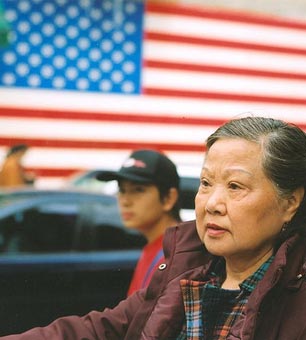As a Wyoming-reared Korean-American, I am on the receiving end of racist microaggressions on a fairly regular basis, from being picked out of a crowd for directions to Chinatown to being asked where I’m really from to being told, “Wow, you speak English very well.” Sure, most of the time I just laugh it off or stew silently, but each incident takes a little longer to recover from because I’m exhausted by a lifetime of being told I don’t belong. Every instance underscores the idea that I’m different. I’m not really American. Except that I am. I was born here and I grew up in Laramie for crissakes.
You don’t get more “American” than me.
And, it is this singular idea of “being American” that underlies racial tensions. There are “deserving” Americans and then there are the others. Many people of color tend to fall into the latter category. Events in Ferguson highlighted how black lives are seen – by many in authority – to matter less than white lives. Even though the wealth of this country was built on their labor, African-Americans are not seen as “deserving” Americans, and the death of a black teenager at the hands of a white police officer, someone meant to “protect and serve,” has had no official repercussions to date. The officer in question remains free and is getting paid, while Ferguson residents have been met with tear gas and excessive violence when exercising their constitutionally protected right to protest.
The question I keep coming back to is how to be an ally when the struggle is not my struggle? I don’t walk down the street in fear of being stopped by the police. There aren’t broad conversations in the Asian community about “respectability” and telling youth to straighten their hair and pull up their pants. Asians are widely seen as “model minorities”: We work hard, we’re seen as not “making trouble,” we’re “good at math,” etc.
Perhaps this uncertainty in how to be an ally is what Bill O’Reilly exploited when he talked about “Asian privilege.” By certain metrics, Asians are advancing more than other groups, even white Americans. Economically, Asian-Americans enjoy the highest median household income ($66,000 a year) of any other ethnic group. Asian-Americans are often granted a type of “honorary whiteness,” in the words of Asian-American activist Suey Park – an honor we can keep only by avoiding critiques of white supremacy and “accepting the role of model minority.”
Yet, we are allowed to advance only so far. No sitting cabinet member is Asian-American, nor are any Supreme Court justices. Only 1.5 percent of college and university presidents are Asian-Americans, according to a 2012 diversity report from the American Council on Education.
Bill O’Reilly is not doing us any favors, either. As many people have pointed out, O’Reilly is using Asians to attack African-Americans. As Scot Nakagawa argues, O’Reilly’s attempt to divide and conquer masks increasing rates of poverty within various Asian ethnicities and is blatant racial manipulation. The point is not that Asians are not the perceived model, but that what O’Reilly is doing is trying to pit people of color against one another to deflect attention away from the damage wrecked by white privilege and racist institutions.
The truth is, some Asians may not see themselves as people of color, but that is how the world sees us: That is why it’s “surprising” we speak English or don’t know where Chinatown is, and that’s why we are exhausted by the continual reminder we are “other,” that we don’t belong. We are still “undeserving” Americans, under the current way of thinking.
In responding to Ferguson, Asian-Americans can begin by recapturing our narrative. Don’t allow yourself to be coopted by other people’s racism at work or in social situations: If you see something, say something. When the O’Reilly’s of the world try to use us to mask their racism, we must stand up to them and expose their hidden anti-black agenda. There is nothing to be gained by trying to be the “model minority” – a term that is used to minimize our contributions and ensure we stay firmly within our place. Our experience is unique and acknowledging and respecting that other communities have their own struggles is the first step towards building multi-racial coalitions that can stand together. Injustice committed against any population is an injustice committed against us all.
Join us in defending the truth before it’s too late
The future of independent journalism is uncertain, and the consequences of losing it are too grave to ignore. To ensure Truthout remains safe, strong, and free, we need to raise $24,000 by the end of today. Every dollar raised goes directly toward the costs of producing news you can trust.
Please give what you can — because by supporting us with a tax-deductible donation, you’re not just preserving a source of news, you’re helping to safeguard what’s left of our democracy.
